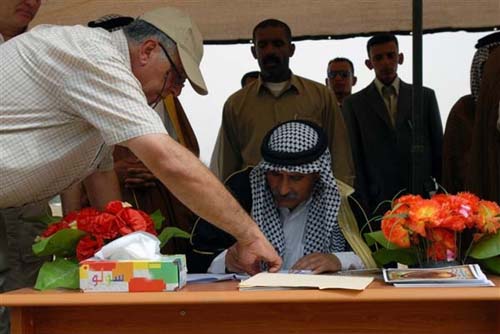Agricultural leaders, provincial government officials, Iraqi security forces and coalition forces recently participated in the Central Euphrates Farmers Market and Agricultural Center Foundation-Stone Ceremony in an open field just north of Kalsu, Iraq.
Sealed in the time capsule was an official document with the signatures of about 15 key individuals who helped to develop the vision of the farmers market, which is scheduled to be built by the end of the year.
“We are happy today to officially corner a stone in this project,” Sheik Kudair Ulawi al-Jubori, chairman of the Central Euphrates Farmers Market and Agricultural Center Management Board, said. “This idea came up, and it has expanded over time, and we are hoping this market will be a great project and meet the needs of the people.”
The vision for the $2.8 million market is to provide a central location for farmers in the area to sell their produce.
“More than 10,000 farmers live in this area, but today, much of this area’s once-fertile farmland lies unplanted and idle,” Army Col. Thomas James, commander of the 3rd Infantry Division’s 4th Brigade Combat Team, said. “There are several reasons for this: a lack of electricity and water, poor drainage, inadequate fertilizing and years of warfare.”
The leaders of the agriculture associations in Jiff Jaffa, Haq, Muelha and Diyarah visited coalition forces and members of the embedded provincial reconstruction team based here in 2007, when security was still an issue, to discuss the farmers market project.
“They laid out their own reasons why a new farmers market needed to be built in this area,” James said. “At that time, the agricultural association leaders were simply looking for a place closer to home where they could come together under the protection of Iraqi security forces to sell their produce.”
Their primary goal then was to sell their produce in bulk from fully loaded trucks to wholesale buyers from urban areas.
“But as we worked this issue and as the area’s security improved, the original vision of a market in an open field grew into a new vision of a permanent market complex with support facilities,” James said.
“Several economic studies conducted recently by our Iraqi partners and the north Babil embedded provincial reconstruction team confirm the existence of a wholesale farmers market in this area would do much to stimulate farm production and encourage reclamation of the lands that are now idle,” the colonel added.
Local agriculture association leaders have recognized this fact for years, and they have long wanted to build and operate a new market in a prime location to satisfy this need. Until recently, however, they were unable to secure the funds required for such a large project.
“Based on this requirement, Iraqi [agriculture] leaders, coalition forces and the north Babil ePRT formed a partnership to seek a solution,” James said. This partnership between Iraqi citizens and coalition forces led to the foundation-stone ceremony that marked the beginning of the market becoming a reality.
And the original vision has expanded to include a center for agriculture research and education, where local farmers can learn about modern practices.
“Here, just west of the Baghdad Highway — the main corridor that connects Basra with Baghdad and Mosul — the market will become critical in stimulating agricultural growth for years to come,” James said.
When construction is complete, James said, the facility will be owned, operated and maintained by the agricultural associations from Jiff Jaffa, Haq, Muelha and Diyarah, who had the original vision. The agricultural associations also bought the land for the complex to become a certified nongovernmental organization. The organization will form a management board to manage and operate the complex.
“With this project, we have seen local leaders come together with coalition forces, with the ePRT and with government officials to address the real need of the people,” James said. “And when this market and agricultural center complex is completed, it will benefit all of the citizens of this area. The building of this facility will stimulate economic activity in a peaceful and secure environment that has been created by the Iraqi security forces and civilian leaders who were tired of violence and insecurity.”
The ceremony was capped off with a procession to the foundation stone, where Sheik Kudair placed the signed document and key leaders took part in the ritual of pouring a trowel-full of cement on top of the document. A tile was then placed at the top of the foundation stone, and it was sealed, marking a new beginning.






















